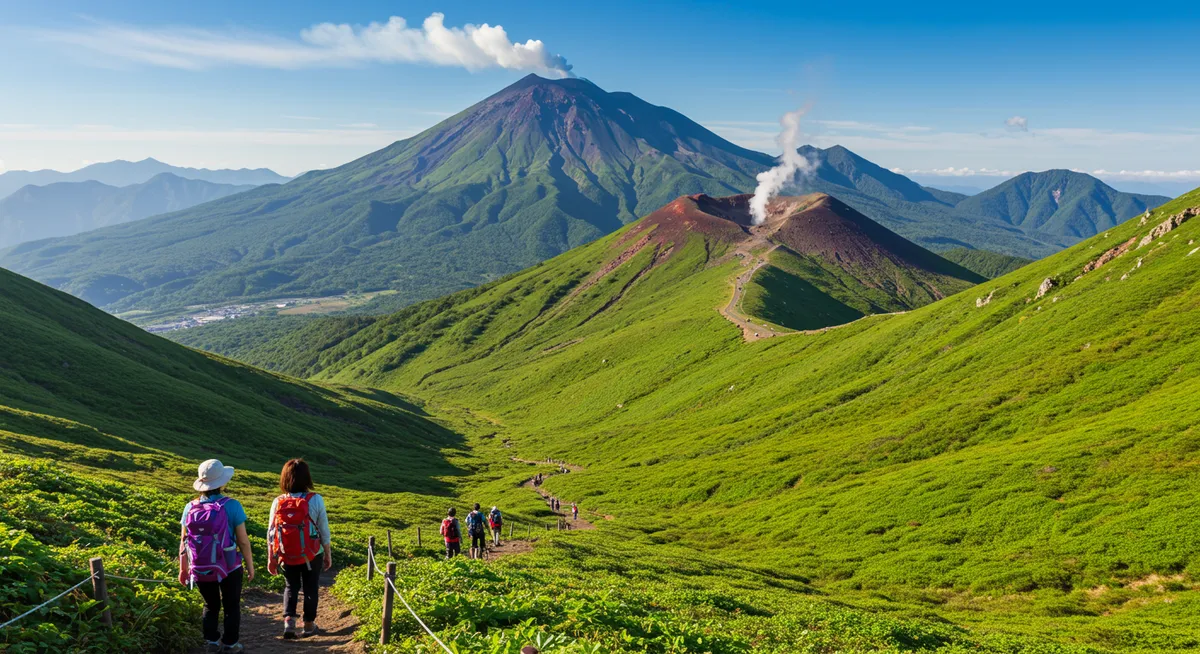
Mount Aso Hiking Trails: A Kumamoto Guide
Table of Contents
Want to find the best nature experiences for this destination? Chat with our nature tourism specialist!
Get Nature TipsCategory: mount-aso-hiking-trails-kumamoto
Your Guide to Mount Aso's Best Hiking Trails
Having explored numerous active volcanic landscapes across the globe, I can attest that the Mount Aso hiking trails in Kumamoto offer an exceptionally unique experience. This colossal caldera, one of the world's largest, presents an incredible opportunity for adventurers to witness powerful geothermal activity up close while enjoying breathtaking panoramic views. Navigating the diverse hiking routes around Mount Aso requires preparation, but the rewards are immense. From gentle strolls to challenging ascents, these trails cater to various fitness levels, making Japan's volcanic heart accessible to many. Immerse yourself in the geological wonders of this magnificent region. For a comprehensive guide to the region, visit Tourist Nature.
Understanding Mount Aso's Dynamic Landscape
Mount Aso stands as Japan's most active volcano, a centerpiece of the Aso-Kuju National Park. Its dynamic nature means that access to certain Mount Aso hiking trails can change due to volcanic activity, necessitating real-time checks before your visit. The caldera itself is vast, encompassing towns, farms, and several peaks, the most prominent being Nakadake, an active crater. Understanding this geological context is crucial for a safe and enjoyable hiking adventure. I've personally witnessed the sulfuric steam plumes, a reminder of the raw power beneath. Always prioritize safety by checking local advisories and adhering to marked paths, ensuring a memorable experience within this impressive natural wonder. Explore the broader area with our Aso-Kuju National Park Travel Guide.
Popular Mount Aso Hiking Trails for All Levels
For beginners, the trails around Kusasenri grassland offer gentle walks with stunning views of Nakadake and Kome-dake, ideal for families. The ascent to the summit of Kishima-dake is moderately challenging but rewards hikers with incredible panoramic vistas of the caldera. Those seeking a more rigorous experience might consider routes leading to the rim of Nakadake, though direct crater access is often restricted for safety. Each of the Mount Aso hiking trails provides a distinct perspective of this geological marvel. My personal favorite is the relatively short hike up Kome-dake, offering unique views of its perfectly conical shape. Remember that trail conditions vary, so wearing appropriate footwear is always recommended for these volcanic paths.
Essential Tips for a Safe Mount Aso Hike
Safety is paramount when exploring the Mount Aso hiking trails. Always check the latest volcanic activity levels and local advisories from the Aso Volcano Museum or visitor centers before heading out. Strong winds and sudden weather changes are common in this highland region, so layered clothing is essential. Carry plenty of water, snacks, and a first-aid kit. Furthermore, ensure your phone is charged, as reception can be spotty in some areas. A general tip: early mornings often provide clearer views before the clouds roll in, and it avoids the midday heat. For optimal conditions, consider what is the best time to visit Kumamoto's nature, especially for outdoor activities.
Beyond the Summit: Nearby Nature Attractions
While the primary draw might be the incredible Mount Aso hiking trails, the surrounding Kumamoto prefecture offers a wealth of additional natural beauty. Consider exploring the serene Kikuchi Gorge with its numerous waterfalls, a perfect contrast to the volcanic landscape. The pristine waters and lush greenery provide a refreshing experience after a strenuous hike. Another option is the scenic climb up Nabegataki Falls, where you can even walk behind the curtain of water. These diverse natural attractions perfectly complement a hiking trip to Aso. For a complete overview of the region's diverse offerings, refer to our guide on Kumamoto's Nature Attractions.
Frequently Asked Questions
Is Mount Aso safe for hiking?
What is the best time of year to hike Mount Aso?
Are there trails for beginners on Mount Aso?
The Mount Aso hiking trails in Kumamoto offer an unparalleled opportunity to connect with Japan's powerful volcanic heartland. From gentle grassland strolls to invigorating summit ascents, there's a path for every adventurer seeking breathtaking vistas and unique geological wonders. Remember to prioritize safety by checking volcanic activity levels and preparing for varied weather conditions. By embracing these stunning landscapes responsibly, you'll create lasting memories of a truly remarkable journey. Don't miss the chance to explore this incredible natural wonder on your next trip to Kumamoto.